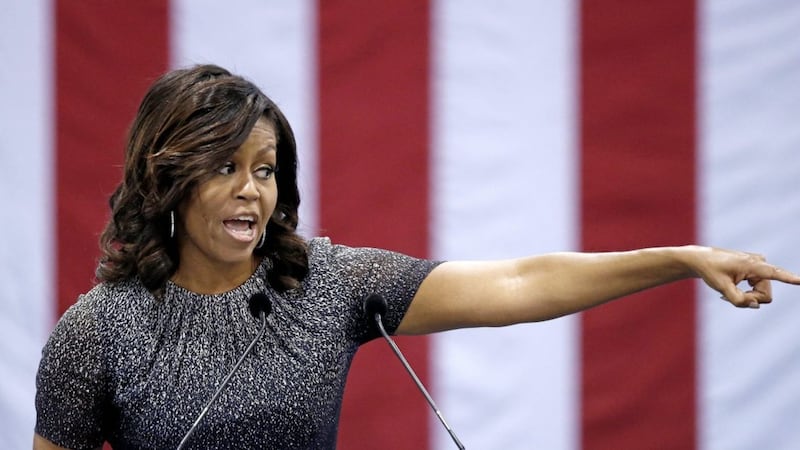IT starts well on growing-up in black Chicago, defends its purpose early: "I've been a working-class black student at a fancy mostly white college. I've been the only African American, in all sorts of rooms... And here I am in this new place, with a lot I want to say."
Massive sales for Becoming, the Michelle Obama memoir, are a surprise and not a surprise.
It might be easy to see it as an attempt to write the best of her husband's presidency into black American history as encouragement, as that vogue word 'uplift', but Michelle Obama might not quarrel with that interpretation.
Given a backcloth of panic about our destruction of the world, waves of desperate people heading for Europe from war, dehydration, poisoned water sources, why would her sales be surprising?
Her message is optimism, what she defines as her faith. Never mind the images of a stunning woman, microphone in hand, smiling that great smile.
She will always be the first black first lady, as she says, therefore of intrinsic interest.
Though did many expect it would read as though truly written by the woman herself? There is acknowledgement of dozens of 'collaborators', many also described as friends. They somehow helped produce a seamless read.
Obama writes her family history as that of loving, selfless parents putting their all into their two children.
The White House years "emboldened" her to be honest and direct about "marginalisation by race and gender".
That she is the great-great-grand-daughter of a slave named Jim Robinson "probably buried in an unmarked grave on a South Carolina plantation" means that she came from "a history of invisibility".
The fact that only a few generations back almost all the families around her as a child had immediate relatives "owned" by others weaves through early chapters but gradually, subtly. It should be read as she wrote it.
Education is Obama's shining light, as it was for her parents. She wants to show the young that if they study marginalisation can be overcome "in some ways". Mostly her optimism is similarly qualified.
She wants young people, in particular African-Americans, to have "a context for the hate surfacing in the news and in political discourse and a reason for hope" (The last words of her four-pages of acknowledgements are "reasons to be hopeful").
It is a far livelier book than this worthiness might suggest. Growing up in Chicago, negotiating her own "voice" was a literal thing.
Taught to speak grammatically, she thinks about the result for the first time when a cousin asks "just a touch hotly, 'How come you speak like a white girl?'"
This meant she said "going" instead of "goin'", "isn't" for "ain't".
Some heard speaking "the white way" as "betrayal, being uppity, somehow denying our culture" (Is it why Sinn Féin people and some others in public life cling to "have went" for "have gone", "I seen" for "I saw"? So, not a tin ear for language but a kind of tribal loyalty, a form of political correctness?).
The perception of whiteness recurs, and early on is linked directly to her future husband: "America would bring to Barack Obama... light-skinned to some, dark-skinned to others... the same questions my cousin was unconsciously putting to me that day on the stoop: Are you what you appear to be? Do I trust you or not?"
She falls hard for Barack but is fairly clear about his limitations. Devoted to his children and to her, he is never going to share the work of home and children: "His freedom to pursue his dreams led me to tamp down my own efforts at work."
Quite how this became their deal still confuses her. Though she always smiled at the least of his failings, his "challenged sense of style".
As his workplace mentor, not yet her boyfriend, she brings him for after-office drinks and notes that he has swapped workclothes for "a white linen blazer that looked as if it'd come straight out of the Miami Vice costume closet. Ah well".
That they had marriage counselling made ripples when the book came out. She disliked politics, shunned it. He ran for president, she made adjustments. Her mother arrived at 4.45am to let her do the gym before work, which shrank the resentment.
But though she believed he could be a great president, "Barack was a black man in America. I didn't really think he could win".
The White House is the less intriguing section though it is all worth reading. Also fast. Go on.








